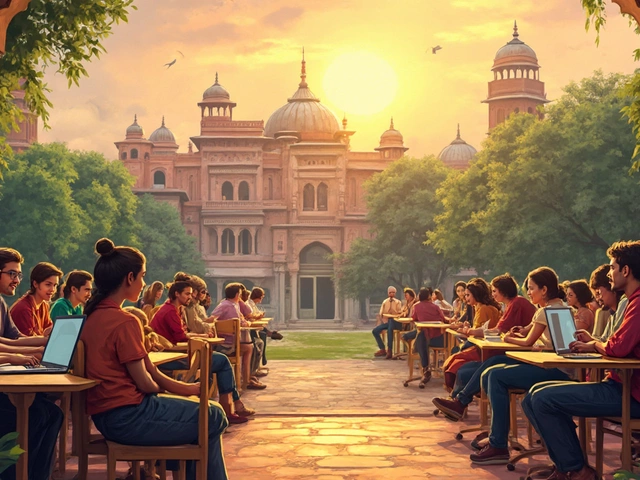The first thing everyone wants to know—CBSE sounds Indian, right? The full form is Central Board of Secondary Education, and it started in India, for Indian students. But here’s the twist: you’ll spot CBSE schools in Dubai, Singapore, and even Africa. So it’s Indian, but you can find it abroad too.
A lot of Indian parents working overseas pick CBSE for their kids so they can move back to India without scrambling to catch up. Big bonus: the books and syllabus stay the same, so kids don’t fall behind even if they switch countries halfway through the year.
But does that make it ‘international’? Not exactly. The core of CBSE—its exam pattern, textbooks and policies—comes straight from the Indian government. Other countries may have CBSE schools, but they’re run for Indians living overseas, not for local students who want an international-style education.
- What Exactly Is CBSE?
- How Indian Is the CBSE Syllabus?
- CBSE’s Global Footprint
- Does CBSE Count as ‘International’?
- CBSE vs. Other International Boards
- Tips for Choosing the Right Syllabus
What Exactly Is CBSE?
CBSE stands for Central Board of Secondary Education. It’s a national-level education board in India, set up by the Government of India back in 1962. That means it’s not a private group or a collection of random schools. The main job of CBSE is to set a standard for schooling all across India from Grade 1 to Grade 12, so kids everywhere can follow the same syllabus and sit for the same exams.
Today, more than 27,000 schools follow this board—most of them in India, but you’ll actually find a few scattered in 28 other countries. The reason? Lots of Indian families work abroad and want their kids to keep up with the Indian curriculum. So, when they move back, their kids fit right back in. It’s kind of like exporting Indian schooling where Indians are.
CBSE isn’t just popular in India; it’s about as mainstream as it gets. If you hear people talk about “board exams” in India, they’re probably talking about CBSE’s 10th (Secondary) and 12th (Senior Secondary) exams. These tests are recognized all over India for college admissions and government jobs.
You’ll find that the CBSE board focuses on Science and Maths, kind of like the fast track for engineering and medical courses. Another big feature? The textbooks—called NCERT—are unified for everyone on the CBSE board, so whether a kid is in Delhi or Abu Dhabi, the content doesn’t change.
- Year of establishment: 1962
- Standardized syllabus and exams across India
- Exports Indian curriculum to over 25 countries
- NCERT textbooks form the backbone
- Accepted widely for higher education and jobs
So, in a nutshell, CBSE is a government-made, widely accepted, and super-consistent school board that aims at keeping things the same wherever you go—even if you cross an ocean.
How Indian Is the CBSE Syllabus?
If you look at the roots of CBSE, it’s straight-up Indian. The entire curriculum, from the textbooks to the exam styles, follows the guidelines set by the National Council of Educational Research and Training (NCERT), which is under the Indian government. This isn’t just paperwork — it means real subjects, examples, and even history portions are tailored to what’s happening in India.
Here’s what that looks like on the ground:
- Social Science and History: Topics focus heavily on Indian politics, culture, and movements. You're more likely to read about Indian freedom fighters than global figures.
- Languages: Hindi and English are mandatory at many levels, and every school must offer regional Indian language options.
- Mathematics and Science: Even the examples in word problems use Rupees and Indian names. Science experiments often use stuff that’s easily available in Indian homes.
In fact, according to official CBSE data from 2024, over 99% of the half a million students taking the class 10 and 12 boards were Indian nationals. That shows just how focused the syllabus is on the Indian context.
| Subject | Typical Focus Area (CBSE) | Indian Relevance |
|---|---|---|
| History | Indian wars, independence, government acts | Very High |
| Math | Rupee-based problems, Indian measurements | High |
| Science | NCERT Indian guidelines | High |
| Language | Hindi (& other local languages), English | Very High |
If you’re preparing for Indian competitive exams like JEE or NEET, the CBSE curriculum fits better than any other syllabus. Most questions in these entrance tests come straight from CBSE textbooks, thanks to that NCERT link.
Bottom line—while the syllabus sometimes mentions global ideas, it’s mainly about India: the people, the culture, and what students need if they plan to live or work in India after school.
CBSE’s Global Footprint
Most people still see CBSE as an Indian board, but it actually stretches out way beyond India’s borders. Right now, the CBSE board has more than 240 schools outside India. You’ll find them in over 28 countries, especially where Indian communities have settled. Places like the United Arab Emirates, Singapore, Oman, and even the USA have official CBSE-affiliated schools.
Why do CBSE schools pop up in so many different countries? Indian families working abroad want their kids to follow the same syllabus, so it’s easier to come back home or keep up with Indian entrance exams. Schools abroad sign up with CBSE in Delhi, follow the Indian curriculum, and run the same major board exams—like Class 10 and Class 12—with papers sent, tested, and evaluated in India.
Here’s a quick look at where CBSE is found outside India:
- United Arab Emirates (biggest concentration – over 75 schools as of 2024)
- Singapore
- Qatar
- Oman
- Saudi Arabia
- Kuwait
- Bahrain
- Nepal
- Malaysia
- USA
The CBSE headquarters in Delhi keeps tight control, so the syllabus and evaluation system stay the same across all these countries. Here’s some data from 2024 to show the spread:
| Country | Number of CBSE Schools |
|---|---|
| UAE | 77 |
| Saudi Arabia | 10 |
| Oman | 13 |
| Bahrain | 3 |
| Kuwait | 5 |
| Singapore | 1 |
| Qatar | 4 |
But even in these countries, the curriculum is designed mostly for Indians, and lessons are taught in English. Admissions often give priority to Indian passport holders. So, while CBSE calls itself international based on its reach, it still sticks tightly to its Indian roots in terms of content, policies, and goals.
Thinking of moving abroad for work? If you want your child to get back into the Indian system one day, CBSE offers a pretty smooth transition. No wild surprises, just familiar books and exam rules, wherever you go in the world.

Does CBSE Count as ‘International’?
This is where things get confusing for a lot of parents. You see CBSE in headlines with words like ‘global,’ but that doesn’t mean it’s on par with truly international boards like IB or Cambridge (IGCSE).
CBSE is rooted in India—everything from the way exams are set to the subjects offered is based on Indian educational goals. The syllabus prepares students mostly for Indian competitive exams like JEE or NEET, not for international university entrance tests such as SATs or A-levels.
- CBSE is managed by the Ministry of Education in India. No outside or global authority shapes the curriculum.
- While there are over 250 CBSE schools outside India, almost all are there for Indian expat families, not to cater to local foreigners looking for a truly international syllabus.
- CBSE does teach English and sometimes a second language, but its main focus is still the Indian context — Indian history, civics, maths, even examples in science.
Here’s a quick comparison you might find useful:
| Board | Origin | Accepted Where? | Who Runs It? |
|---|---|---|---|
| CBSE | India | India, Indian embassies, Indian schools abroad | Indian Government |
| IB | Switzerland | Worldwide (universities abroad prefer this for admissions) | International Baccalaureate Organization |
| IGCSE (Cambridge) | UK | Worldwide | Cambridge Assessment International Education |
If you’re aiming for a foreign college, CBSE is accepted in some universities abroad, but not everywhere. They usually ask for extra proof — SAT scores, language tests, recommendation letters, or bridge courses. On the other hand, IB and IGCSE are designed with international university entry in mind, so the process can be easier with those.
Bottom line: CBSE isn’t considered ‘international’ in how it’s built or run. It travels with Indians, but it doesn’t change its core. If you’re planning to stay in India or return soon, CBSE works well. But if global study is your goal, you might want to look at real international boards instead.
CBSE vs. Other International Boards
When people talk about international boards, they usually mean the IB (International Baccalaureate), IGCSE from Cambridge, or even boards connected to national systems in the US or UK. The big question—how does CBSE stack up next to these?
One thing that stands out: CBSE bases everything on Indian culture, government policy, and mostly English or Hindi. On the flip side, international boards like IB or Cambridge are always hunting for global perspectives. Their textbooks, assignments, and even classroom discussions try to connect science or history to what’s happening around the world, not just one country.
Here’s a quick comparison to make it easy:
| Feature | CBSE | IB (International Baccalaureate) | IGCSE (Cambridge) |
|---|---|---|---|
| Syllabus Origin | India | Switzerland (Global) | UK (Global) |
| Recognition | Indian universities, some abroad | Universities worldwide | Universities worldwide |
| Languages Offered | Mostly English, Hindi | Multiple world languages | Multiple world languages |
| Focus Areas | Math, Science, Indian Social Studies | Global, Critical Thinking, Research | Global, Application, Analysis |
| Assessment Style | Mainly board exams, theory-based | Projects, essays, exams (mix) | Coursework & exams (mix) |
If you want your child to study only in India, CBSE is perfect—loads of Indian colleges prefer or even expect CBSE students. But if you want those ‘study in the US or UK’ doors wedged wide open, IB or IGCSE might make life easier, especially for university admissions abroad.
Cost can be another deal-breaker. International boards almost always cost more—sometimes double or triple what CBSE schools charge. Not everyone wants to spend a fortune unless they’re sure about going overseas.
All that said, lots of international universities will still take CBSE pass-outs, especially if their grades are strong. A little research on your target country goes a long way.
- If your plans are solidly Indian, CBSE is your safest bet.
- If international options matter, look hard at IB or IGCSE for that global exposure.
- Switching between systems? It’s possible, but not a breeze—curriculums and milestones rarely line up perfectly.
Tips for Choosing the Right Syllabus
Picking between CBSE, state boards, or international options like IB or Cambridge isn’t just about popularity. It's about what fits your kid’s future plans, learning style, and where your family might move.
If you’re leaning towards the CBSE syllabus, here’s what makes it click for lots of families:
- CBSE works great for students aiming for engineering or medical entrance exams in India, like JEE or NEET. The pattern and content match those exams closely.
- Most Indian competitive exams, like UPSC or banking tests, also line up closely with CBSE content. Easier for students to prep later.
- If you move internationally but plan to return to India, CBSE has schools in 28+ countries—so your child’s books and subjects won’t change.
- CBSE’s marking is more straightforward (no subjective grading), so it’s less stressful for those worried about unpredictable marks.
If you’re thinking international schools, check if your kid plans to study abroad for college. IB and Cambridge open more doors if you’re aiming for universities in the US or Europe. Their teaching styles focus more on research and projects, while CBSE is big on theory and exams.
Here’s a quick comparison to help you weigh things:
| Board | Main Focus | Global Recognition | Ideal For | No. of Countries Present |
|---|---|---|---|---|
| CBSE | Exams & core subjects | Accepted in India, recognized in many countries but not always preferred | Indian competitive exams, families planning to return to India | 28+ |
| IB (International Baccalaureate) | Concepts & research | Highly accepted worldwide | International university admissions | 150+ |
| Cambridge (IGCSE/A Levels) | Subject flexibility & projects | Highly accepted worldwide | Specialized or early international moves | 140+ |
Your budget also matters—international boards often charge much more than CBSE. Plus, check if your city even offers other options. In smaller towns, CBSE might be the only real choice.
Bottom line: match the syllabus with your child’s future plans, your work location, budget, and how your kid learns best. Don’t just follow the crowd—think ahead to where their path is really headed.






Write a comment: